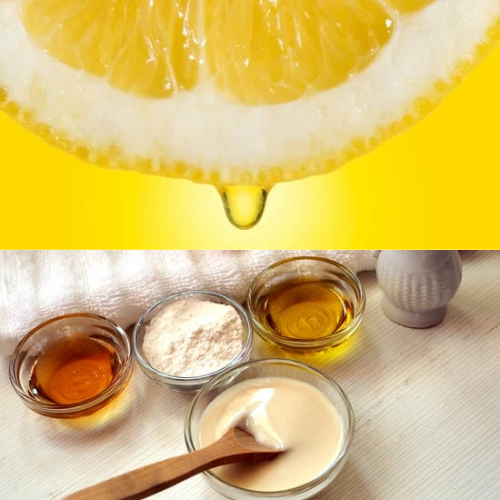
Lemon on Face
Many people apply lemon juice to their face, mostly through DIY remedies, but only few are aware of its potential benefits and drawbacks. Before incorporating lemon into your skincare routine, it’s crucial to understand its effects on the skin. In this post, we’ll explore the ins and outs of using lemon on face.
Is lemon good to use in DIY facial remedies?

Lemon is an excellent addition to DIY remedies, thanks to its brightening and hydrating benefits. With its long history of use in skincare, lemon has proven to a valuable partner in enhancing the benefits of DIY remedies. Adding a few drops of lemon juice to natural DIY remedies can work wonders on your skin. Feel free to incorporate lemon into your natural skincare, but be sure to dilute it with ingredients like honey, water or milk. Never apply undiluted lemon juice directly to your skin, as it can be too harsh.
- A great partner in DIY remedies: Lemon is an excellent addition to DIY skin remedies
- Fights Acne-Causing Bacteria: The antibacterial properties in lemon help to combat with acne- causing bacteria and promotes clearer skin
- Brightens Skin: Adding a few drops of lemon juice to DIY remedies can help to brighten and even out skin tone
- Gentle Exfoliates: Adding lemon in DIY remedies also helps to gently exfoliate skin.
Skin types that should avoid using Lemon

While lemon can be beneficial for some skin types, it’s not suitable for everyone, particularly those with sensitive and acne-prone skin type. When skin can’t tolerate lemon’s acidity it may lead to adverse reactions like breakouts, rashes, irritation and increased sensitivity. In such cases, it’s best to avoid using lemon on the skin.
- Acne-prone skin type: If you have severe acne or bumps on your face, it’s best to avoid using lemon on your skin. Lemon juice can exacerbate acne and cause itchiness and irritation even when diluted. To be safe, it’s not recommended for people having acne.
- Sensitive skin type: Lemon is not suitable for sensitive skin, as its high concentration of vitamin C can cause adverse reactions and skin issues. If you have sensitive skin, it’s best to avoid using lemon altogether.
- Over-dry skin type: In case you’re having extremely dry skin, lemon can worsen dryness and irritation. Despite its potential hydrating properties, lemon is not recommended for overly dry skin types as it can strip the skin of its natural moisture.
What is the ideal concentration of lemon juice good for face?

Understanding the ideal concentration of lemon juice for your skin is crucial, as every skin type reacts differently. However, it’s crucial to understand your skin type and concerns before using lemon. The right concentration depends on your skin type, concerns and how your skin responds to lemon juice, allowing it to harness its benefits positively.
- For dry, combination and oily skin type, start with a small amount ( about half a teaspoon ) of lemon juice diluted with water or other soothing ingredients to minimize potential irritation and balance its benefits.
- For instance if you have acne-prone skin, it’s best to avoid lemon juice altogether because the high concentration of citric acid in lemon can worsen acne.
- Remember, the key is to observe how your skin reacts to lemon juice and adjust accordingly.
Is Lemon Good for face?
Yes, lemon can be great for skin due to its antioxidant, antiseptic and brightening properties. While skincare market and beauty influencers swear by lemon-based products, it’s essential to know the right concentration and combination with other ingredients to maximize its benefits and avoid any adverse effects.
Do’s and Don’ts

Lemon can be great for your face, but overusing it can have negative effects. To get the most out of lemon, it’s crucial to know what to do and what to avoid. Here are the essential do’s and don’ts for using lemon in your skincare routine.
Do’s
- Starting with low concentration: Begin with low concentration and gradually increase as your skin becomes more tolerant
- Patch test: Always do patch test before applying lemon to your skin to check for any adverse reactions
- Dilute with natural ingredients: Mix lemon with other natural ingredients to balance its benefits and reduce potential irritation or over sensitivity
- Understand your skin concerns: Know your skin type and concerns, then use lemon accordingly to maximize its benefits.
Don’ts
- Avoid direct application: Never apply undiluted lemon juice directly to your skin, as it can cause irritation and other adverse effects.
- No rubbing with lemon slices: Refrain from rubbing a slice of lemon directly on your face, as it can be too harsh for your skin.
- Be cautious with sensitivity: If you’re unsure about your skin’s sensitivity, avoid incorporating lemon into your skincare routine to prevent potential negative effects on skin.
Check here to find👉🏾Best skincare routine for your young 30’s
